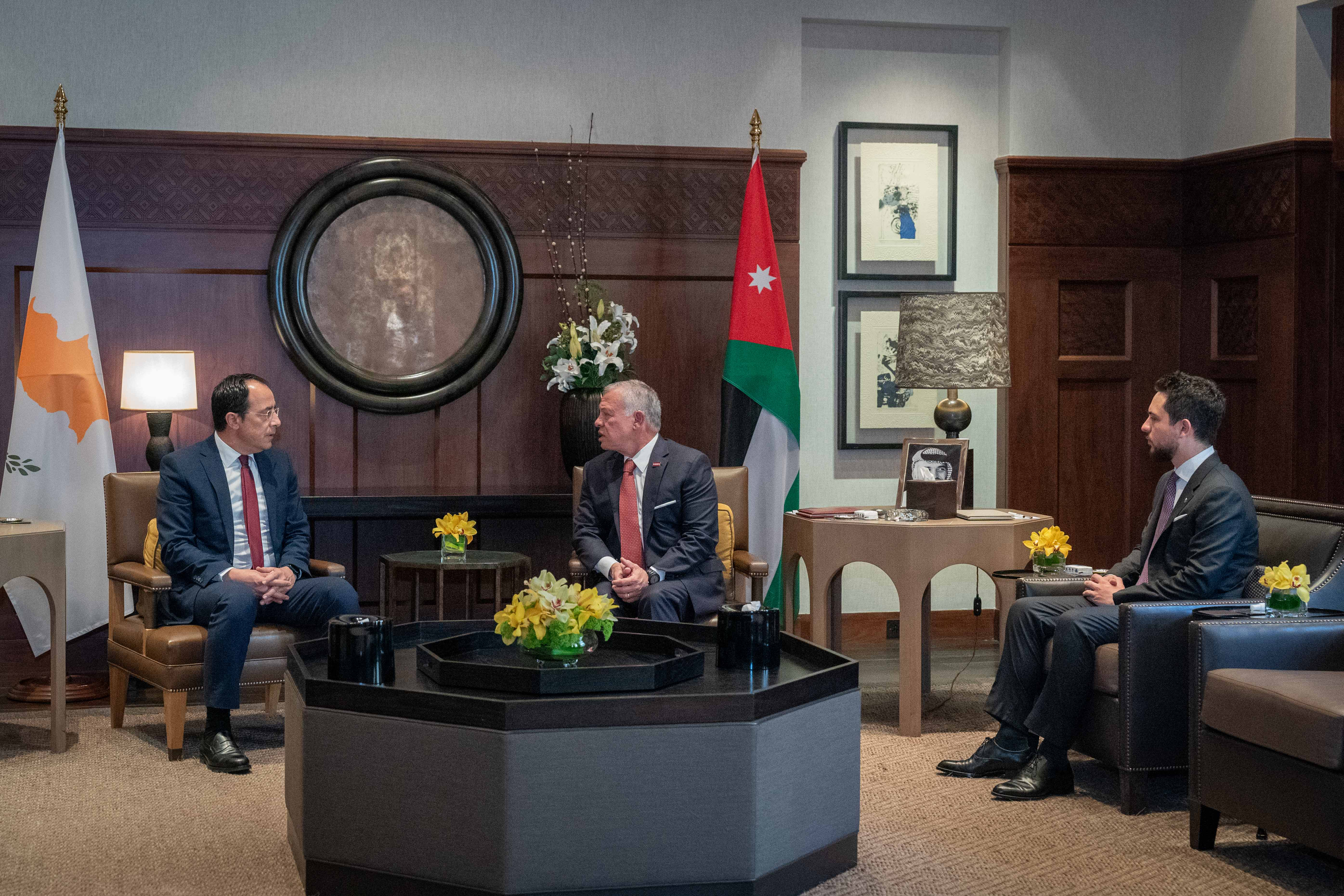Amman, Jordan— Jordan and Cyprus are looking to boost cooperation in energy, trade, industry and tourism sectors in order to deepen the overall partnership between the two countries.
In this regard, King Abdullah and Cyprus President Nikos Christodoulides met on Tuesday at Al Husseiniya Palace, and discussed enhancing cooperation in various fields, as well as regional and international developments.
At a bilateral meeting followed by an expanded one attended by Crown Prince Al Hussein bin Abdullah II, King Abdullah highlighted the need to bolster bilateral relations and cooperation, especially in energy, trade, industry, tourism, and ICT, commending Cyprus’ development and economic support.
In remarks at the top of the expanded meeting, the king expressed pride in the deep-rooted relations between the two countries, adding that such meetings are a chance to enhance cooperation, politically and economically, as well as in defense, which sees close cooperation between Jordan and Cyprus.
The king highlighted President Christodoulides’ role in his previous capacity as foreign minister saying, “you were a friend and an ally to all of us in dealing with challenges in our region”.
For his part, President Christodoulides said he is happy to visit Jordan as president of Cyprus.
“You know how much we value your role and Jordan’s role as a pillar of stability in our neighborhood, a neighborhood with a lot of challenges, but at the same time a lot of promises,” he said.
The Cypriot president underlined the excellent relations between the two countries, as they always work together to tackle challenges, and take advantage of opportunities.
He noted that the memoranda of understanding signed during the visit indicate the political will to strengthen relations.
“I always enjoy the discussions with you, and of course with your foreign minister, on regional developments,” the president added, addressing the king.
President Christodoulides pointed to discussions of a number of issues, including the Palestinian cause, adding, “you know very well our principal position on the two-state solution”.
“On the issue of Syria, I know the burden that Jordan is having with the refugees’ issues, and we think that the international community needs to do much more to support Jordan in this purely humanitarian issue,” he said.
President Christodoulides noted the importance of discussing European relations with Jordan, adding, “you know Cyprus is the strongest supporter of enhancing tangibly this relationship”.
At the meeting, the two sides agreed on maintaining trilateral cooperation between Jordan, Greece, and Cyprus, in service of the three countries and their peoples, as well as regional development, and stressed the need to coordinate efforts to counter food and energy security challenges, as well as climate change.
The king commended Cyprus and the European Union’s support for peace efforts, based on the two-state solution.
He called for stepping up efforts toward calm and de-escalation in the Palestinian Territories, and ceasing any unilateral measures that could threaten stability and undermine peace prospects.
He reaffirmed the need for the Palestinian people to attain their just and legitimate rights, including the establishment of an independent Palestinian state on the 4 June 1967 lines with East Jerusalem as its capital.
The king stressed that Jordan will continue to exert all efforts to safeguard Islamic and Christian holy sites in Jerusalem, under the Hashemite custodianship.
Discussions at the meeting also covered the Syrian crisis and means of stepping up international efforts to reach a political solution that addresses its humanitarian, security, economic, and political repercussions, as well as supporting Iraq’s efforts to enhance its stability and security.
The impact of the refugee crisis on host communities was also discussed, including the need to maintain international support for refugees, while working towards political solutions to regional crises to avoid the eruption of further refugee influxes, and enabling the voluntary and safe return of refugees.
The two sides also agreed on the need to maintain ongoing international efforts to counter terrorism within a holistic approach.
On the sidelines of the visit, the two countries signed memoranda of understanding on development and investment cooperation, as well as a technical arrangement regarding aerial firefighting assistance in cases of emergency.








